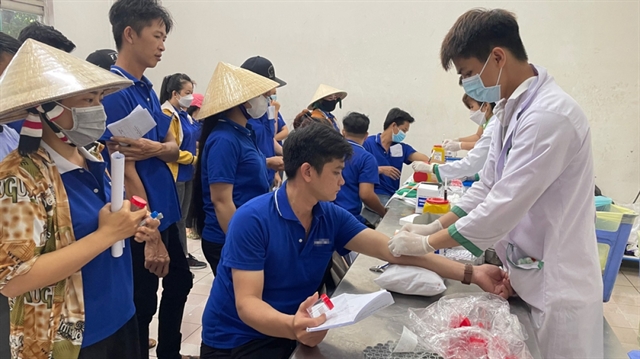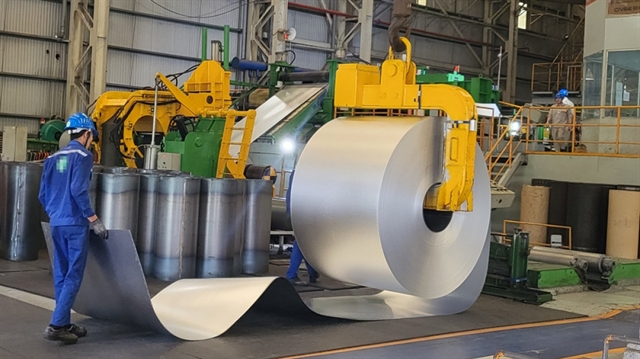 |
| Businesses organise medical examinations for workers. — Photo vov.vn |
Working at a garment company in Tân Uyên city, Bình Dương Province, for nearly 10 years, Mai Văn Đô, 49, encounters daily exposure to extreme noises in the pressing workshop.
Four years ago, during a routine health check organised by the company, a doctor informed Đô of signs of occupational deafness. To be more certain, he needed to undergo further examination at the hospital, which worried him as he feared the company would terminate his employment if they found out about his occupational disease, so he kept it a secret.
As time passed, his hearing ability became more limited, so he requested the company send him for a medical examination and to change his job position.
After confirming his occupational injury, the company provided him with an additional VNĐ1 million (US$41.56) per month as support. But recently, Đô decided to resign from his job due to his deteriorating health.
"It's like there's a constant ringing sound in my ears. I can hear if someone speaks loudly and slowly, but if they speak softly, I can't hear anything. It's frustrating," said Đô.
"I believe that if I work and contribute both sweat and money to the company, it's worth it. But if I can't make a meaningful contribution, I'd rather resign," Đô added.
Đô is just one of many workers suffering from occupational injuries while working in various businesses in Bình Dương. Besides those who have undergone medical examinations and been diagnosed, there are still many workers who are careless about their health, avoiding medical check-ups and fearing that if they are found to have a disease, they might lose their jobs and incur treatment expenses. They reluctantly accept to "live with" occupational injuries to make ends meet, unaware of the potential long-term consequences.
Lê Văn Tấn, a specialist in community health at the Provincial Centre for Disease Control in Bình Dương, warns that occupational injuries are highly dangerous and progress slowly. By the time symptoms appear, it's often in the advanced stages. Workers must take the initiative to protect their health. When they discover they have an occupational injury, they should inform their company to undergo medical examinations and request a transfer to a less hazardous workplace.
"Once someone has an occupational injury, the treatment time is prolonged and costly because it has become a chronic condition," explained Tấn. "Occupational injuries can progress to more advanced stages, including cancer, which is extremely dangerous. Although the likelihood of progressing to cancer is low, most occupational injuries do not fully recover. If a worker continues to work in the same environment, the condition can worsen."
 |
| Workers in environments with extreme noises have two medical checkups per year, according to regulations. Photo vov.vn |
Measures needed
According to the regulations of the Labour Code and the Law on Occupational Safety and Health, employers are required to organise annual periodic health check-ups for all employees at least once a year. For employees working in hazardous environments, health check-ups must be conducted every six months.
Currently, Bình Dương has nearly 62,000 businesses with approximately 1.3 million employees. However, it has been observed that only large enterprises comply with these health check-up regulations, while small and medium-sized enterprises are often negligent in organising periodic health examinations and disease screenings for their workers. In the long run, this negligence increases the risk of more cases of occupational injury and disease.
Nguyễn Hoàng Bảo Trân, a member of the National Assembly and Vice Chairwoman of the Bình Dương Province Labour Union, stated that many business owners are currently not paying enough attention to this matter. Therefore, labour unions at the grassroots level must enhance their supervision role.
"In addition to encouraging workers to care about their health, labour unions must also monitor the implementation of the company's policies regarding periodic health check-ups for employees," said Trân. "If a company does not comply or has not complied, they must be required to do so immediately and ensure compliance with the regulations. In addition to periodic health check-ups, female workers should also receive gynaecological examinations."
Nguyễn Văn Leo, Head of the Labour Management Division at the Provincial Industrial Zones Management Board in Bình Dương, said that every year the board conducts inspections and issues reminders to businesses to improve the working environment and take care of the health of their employees.
Among the businesses under its purview, 96 per cent of a total of 3,054 businesses are conducting health check-ups for their workers, which amounts to around 500,000 employees. For those businesses that are still negligent, they will continue to be reminded.
"The management board has issued reminders to businesses to conduct periodic health check-ups for employees. Companies must also inform workers in departments with hazardous conditions that they will undergo health check-ups twice a year," said Leo.
According to labour experts, due to relatively low penalties, some businesses are not genuinely concerned about the health of their workers and may even try to evade their responsibilities.
In addition to legal penalties, authorities at various levels in Bình Dương need to take strong measures against businesses that disregard the health of their employees. Only through these actions can the health and dedication of the workforce be ensured for the overall development of the province. —VNS